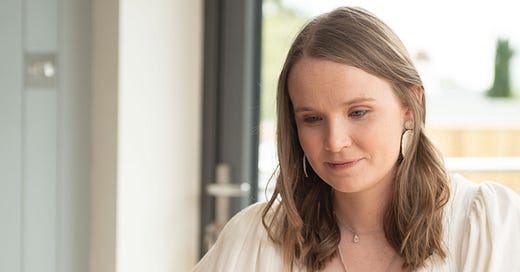“I’m Just Not a Writer”: The Stories Kids Tell Themselves
What if low confidence sounds like a story we tell ourselves—and what if rewriting that story is where real learning begins?
It always starts with a story.
Not the ones kids write down. It's the ones they tell themselves. The one-liners they carry around as "perceived" truth:
"I'm just not a writer."
"I never have good ideas."
"I hate reading."
"I always mess up spelling."
"My brain doesn't work that way."
"Reading's just not my thing."
At first, these sound like facts. Observations. But they're not. They're stories. Well-worn narratives kids repeat enough times to feel true, often without even realizing it, becoming identity-level beliefs.
I was recently in a mentor meet session with a student and was exploring why writing felt hard for him when he said, "I guess I'm just not a writer." He said it with that particular kind of certainty that tells me: this isn't the first time he's said this. I didn't correct him — "Don't be silly" — or offer reassurance — "Of course you are!”
Instead, I stayed curious.
I asked him, "When was the first time you remember telling yourself that story?"
He answered me hesitantly. I could see it in his eyes. "What kinda question is that?"
Then: "Who have you told it to?"
And finally, "How has it changed now since when you first told it to now telling it to me?"
He paused. Looked down. Then said, "I'm an even worse storyteller."
That stopped me.
That spiral. The belief that saying the story out loud makes it more true is something I've seen before. That feeling that admitting a struggle is the same as failing. And in that moment, I felt the heaviness of what so many kids carry around. Not just fear of getting it wrong, but fear that being seen at all might confirm their worst beliefs about themselves.
So I asked, gently, "What's been going on that made you start thinking that?"
He shrugged. "Because I haven't done anything."
The evidence, in his mind, was the silence. The not-writing. The lack of output.
It's wild how often kids interpret stuckness as failure — as proof of the story they've been telling. And, ironically, many of these kids are excellent storytellers. They just don't know it yet because they're using those skills against themselves.
He told me he hated writing classes his mom had signed him up for and never enjoyed them. I asked, "If we could revise that story, where would we start?"
Now, I want to be honest here. There wasn't a dramatic breakthrough moment. The conversation was messy, full of resistance, and quiet frustration. But I didn't try to overwrite his story —I sat beside it and asked if we could look at it together.
Because I've come to believe that these beliefs — these internal scripts — are more like first drafts than facts. And like any first draft, they're allowed to be messy. They're not the final version. They can be revisited, revised, softened, and rewritten.
Anne Lamott calls them "shitty first drafts." That term has stuck with me — not just because it's funny and true but because it gives permission. It reminds us that even seasoned writers don't start with brilliance. They start with something shaky. Something uncertain.
Brené Brown reframes it as the "stormy first draft" — full of emotion, assumptions, fear, and storytelling. And that framing feels even closer to what I see with kids. Because their self-talk isn't just critical — it's often deeply emotional. It's tied to rejection, embarrassment, perfectionism, and comparison. It's weather — the inner kind.
And if we treated self-talk like rough drafts? What might change?
What if we helped kids see that their beliefs — just like their stories — are not fixed? What if we taught them to step back and ask, "Is this story still helping me?" or "What else might be true?"
When I asked that same student those questions, I didn't expect a complete rewrite. But I hoped to open the door — even just a crack. Enough space for a little air to get in. And here's the part I didn't expect:
When I woke up this morning before posting this article, that same student sent me a message. I haven't opened it yet. I don't know what it says. But I know this: he hasn't closed the book. There's another chapter coming.
Confidence isn't always about "I can do it!"
Sometimes it's about maybe I'll try again.
Or maybe that story's not finished yet.
Or even maybe there's more to me than I thought.
These quiet shifts matter more than we think. They're not just the beginning of better writing — they're the beginning of a different relationship with learning, with self-talk, and with belief.
The story they tell themselves today isn't the one they have to carry tomorrow.
And maybe — just maybe — we're here to help them write a different one.



